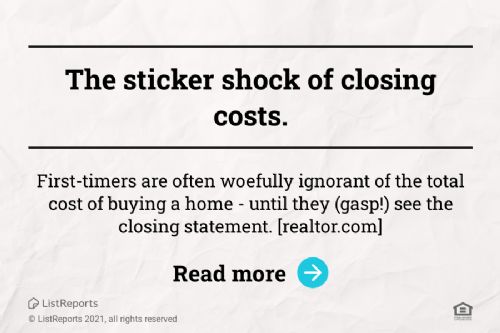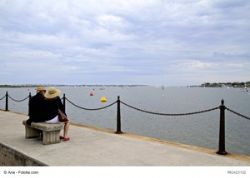Click on the image to read the full article! #article #news #notablearticle #listreports #realestateClick on the image to read the full article! #article #news #notablearticle #listreports #realestateClick on the image to read the full article! #article #news #notablearticle #listreports #realestateThe Hidden Costs Many First-Time Homebuyers Have Never Heard Of
Many of today's homebuyers are suffering from sticker shock—and not just over astronomical home prices.
Nearly half of homeowners, 44%, report they weren't aware of the costs associated with buying a home, according to a Realtor.com® survey in July of nearly 3,000 adults, including 1,800 homeowners. (About 400 of the respondents were buyers who purchased a home within the past 15 months.) This includes paying for things like a home inspection, document fees, property taxes, home insurance, and title fees. About 11% weren't even factoring in moving expenses.
"Unlike most big-ticket consumer purchases, for which most people pay the price plus sales tax, a home purchase comes with a number of additional costs," says George Ratiu, manager of economic research at Realtor.com. "Many first-time homebuyers, particularly younger ones, don't realize how much closing costs add to a price of a home. It's significant."
Nationally, homeowners paid an average $6,087 for single-family homes in closing costs in 2020, according to real estate data and technology company ClosingCorp. This includes title policies, appraisals, settlement and recording fees, land surveys, and transfer taxes—which can vary geographically.
The ClosingCorp estimate did not include home inspections, property taxes, home insurance, or moving costs, which can add tens of thousands of dollars to the cost of a home.
"Closing costs can range between 2% to 5% of the loan amount," says Stephen Rosen, head of sales at the digital homeownership company Better.com. "Generally speaking, the higher the amount of the loan, the lower the percentage of closing costs you'll need to pay. This is because a number of closing costs are fixed."
That high total surprised about a fifth of homebuyers, 21%, according to the Realtor.com survey. Roughly 16% reported being frustrated because they didn't expect to have to pay for so many things on top of the price of their home.
More than half of homeowners, 53%, also didn't include potential renovations in their budgets when they bought their homes, according to the Realtor.com survey.
"For people looking to purchase their first home, it's important to research the costs involved in signing a contract to buy a home," says Ratiu. "The purchase of a home, for most Americans, is their single largest financial commitment."
A home inspection, for example, informs buyers of any potential problems with the property they hope to purchase—and if they'll be making costly repairs before they even move in. The inspection typically runs from $300 to upward of $600 depending on the location and size of the home. And while many buyers have been waiving an inspection to make their offer competitive in today's cutthroat market, that goes against the advice of many real estate experts. No one wants to max out their budget on a home, just to find out they need to spend an unexpected $50,000 to fix the foundation.
"The few hundred dollars you'll spend on a home inspection is well worth it," says Ratiu.
Title insurance is another component of the homebuying process that many first-time buyers may not be familiar with. The title review and insurance basically make sure that the person selling the property has the ability to do so. It also ensures there aren't any liens, or debts, on the property that a buyer could be forced to assume once the sale is complete.
Buyers may want to consider talking to different lenders to get the best deals on closing costs.
"Some fees are negotiable, some fees you can shop around for, and some fees—such as points or credits—are within your control," says Better.com's Rosen. Buyers typically pay a certain additional amount to their lender for points and credits that lower mortgage rates or reduce closing costs.
"Some fees vary between lenders, while others will be the same no matter who you work with," says Rosen.
Cash-strapped buyers can also consider rolling some of their closing costs into the mortgage if their lender permits it. However, this does increase the size of the loan.
"For many first-time buyers struggling with the down payment, that might be a viable option," says Ratiu.




